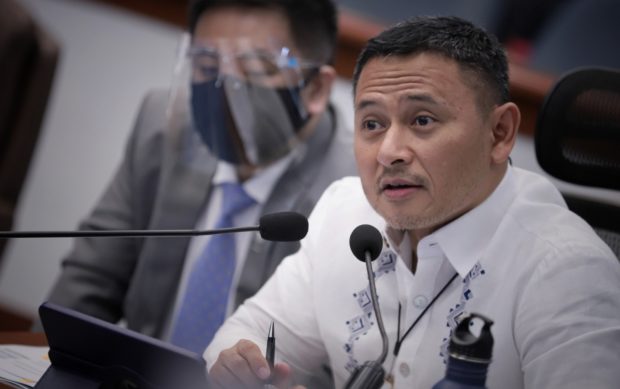
Sen. Juan Edgardo “Sonny” Angara Jr. starts his defense of Senate Bill No. (SBN) 2057, An Act Expediting the Procurement and Administration of Vaccines for the Protection Against the Coronavirus Disease 2019 (Covid-19) during Wednesday’s hybrid plenary session, February 17, 2021. (Joseph Vidal/Senate PRIB)
MANILA, Philippines — Some senators are wary about the proposed institutionalization of Covid-19 “vaccine passports,” saying this could discriminate and restrict the mobility of those who opt not to be inoculated.
Establishing a “vaccine passport” program that would give “certain benefits” to those in possession of it could pressure others to get vaccinated, according to Senator Aquilino “Koko” Pimentel III. He raised such a point during Wednesday’s plenary deliberations on Senate Bill No. 2057.
Aside from expediting the purchase and administration of Covid-19 vaccines in the country, the measure also seeks the issuance of vaccine passports to inoculated individuals.
The said passport will serve as a record of all the Covid-19 vaccinations they’ve received.
“I’m just worried that if we now establish a vaccine passport program and the word ‘passport’ actually connotes or affects mobility,” Pimentel said.
“If we are requiring a vaccine passport for the mobility of our people, are we not indirectly telling them or pressuring them that the Covid-19 vaccination is mandatory if you want to be a mobile person?” he asked.
The senator pointed to a provision in the bill wherein individuals who have “completed Covid-19 immunization may be granted certain benefits or exemptions.”
These include international travel as may be allowed in foreign jurisdictions, non-essential domestic travel, as well as access to business establishments allowed to operate based on guidelines Inter-Agency Task Force (IATF) on Emerging Infectious Diseases guidelines.
“By using these regulations, the people might get the feeling that there is no more choice except to get vaccinated, otherwise, we cannot probably move around, there’s no more non-essential domestic travel,” Pimentel said.
“We must be fair between vaccinated and non-vaccinated people. This is my worry that if we now give these benefits or exemptions,” he added.
Pimentel said he sees the “danger” of giving such benefits or exemptions because it could lead to business establishments making “vaccine passports” mandatory before a person can enter or avail of their services.
“What if, let’s say, a majority or 100 percent of business establishments adopt this as a policy, paano na po ‘yung walang vaccination? Walang vaccine passport?” he said.
Responding to Pimentel’s concerns, Senator Sonny Angara, sponsor of the proposed measure, said nothing in the measure “legally compels” people to get vaccinated.
Angara repeatedly affirmed that Covid-19 vaccination will not be mandatory.
“It’s just really to certify that that person was vaccinated…we are not tied to the name passport if you want to call it something else, we can call it a vaccine certificate or card,” Angara said.
While he understands Pimentel’s worry, Angara said the “vaccine passport” could be a way of incentivizing people to get inoculated.
“It’s not really a compulsion but sort of an incentive in a sense because then you have [fewer] restrictions on your person,” Angara said.
Further, he pointed out that the provision that elicited concern from Pimentel “only provides for permissive language.”
“It only says…‘may be’ granted certain benefits,” Angara noted.
Pimentel then suggested that to encourage people to get inoculated, it would be better to promote vaccination through an information drive and have “high-profile personalities” encourage the public to get vaccinated.
“These are better approaches rather than putting the foundation for possible discrimination, discriminatory practices in the future. Possible po,” he said.
“Kasi just imagine a society where 100 percent of the business establishments will now require the showing of the vaccine passport before entry…so nagkaroon na po ng discrimination,” he added.
Senator Joel Villanueva shared Pimentel’s concerns since the issuance of “vaccine passports” might be “perceived forcing the vaccination program to our people.”
“With regard to the word ‘passport,’ I share the sentiments of Sen. Koko that when you talk about passport, it’s mobility. So this might have some misconception in the end,” he added.
Senator Francis Tolentino, meanwhile, said this could lead to the stigma against those who are not vaccinated.
“There might be some discriminatory effect insofar as not possessing that passport. You might not be allowed to enter a restaurant or a resort so it might develop into a stigma so to speak when you are not vaccinated,” Tolentino said.
In response, Angara said that stigma is something imposed by society.
“I cannot predict that. It’s something that can exist with or without the law,” he said.
Villanueva said proper wordings could be proposed during the bill’s period of amendments.
“As the sponsor, we’re open to any suggestion from our colleagues,” Angara said.